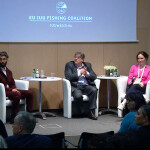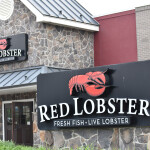The Ocean Stewards Institute yesterday supported a proposed government rule authorizing the Minerals Management Service to issue leases, easements and rights of way for open-ocean fish farms in federal waters, "provided there is adequate environmental monitoring and operational oversight by other relevant federal agencies."
The Bush administration's proposed rule drew a lot of criticism last week from the environmental community, which questioned the MMS's ability to regulate such use and the likelihood of converting unused oil platforms into fish farms. The MMS is part of the U.S. Department of the Interior.
But the Ocean Stewards Institute, a trade organization formed last year to advocate the development of open-ocean aquaculture, contends that the MMS may well be the most appropriate agency to issue leases, easements and rights of way for open-ocean fish farms.
"MMS is already in the business of issuing leases in federal waters," says Neil Sims, president of the Ocean Stewards Institute and Hawaii's Kona Blue Water Farms, one of three U.S. open-ocean fish farms. "In an ideal world, we believe that [the National Oceanic and Atmospheric Administration] should be the lead agency for coordinating development of open-ocean aquaculture. NOAA's most valuable input is in providing operating specifications to ensure that fish farms meet federal environmental standards and minimize the potential impact on ocean ecosystems. If fish farms are to operate within the boundaries of existing oil, gas or mining leases, then MMS may indeed be the best means to address the legal issues."
According to Sims, any such activity is already required to comply with Environmental Protection Agency and Army Corps of Engineers requirements to ensure surrounding waters and the ocean floor aren't adversely impacted.
The Ocean Stewards Institute is advocating for the National Offshore Aquaculture Act, which would establish a regulatory framework for aquaculture in federal waters, extending 3 to 200 nautical miles offshore.
"If we had this legislation in place, we could be moving in this direction, but progress toward comprehensive legislation has been stymied by those who would oppose such careful first steps," says Sims. "So this would seem to be a reasonable alternative. There appears to be lots of existing empowering legislation. All that is now required is a will to make it work."





